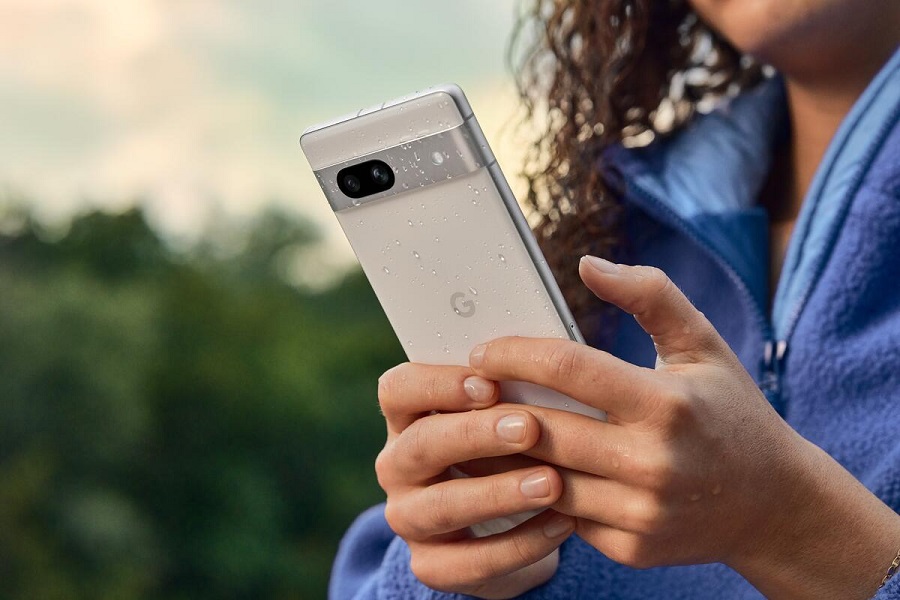Telecom
Here Are 15 Coolest things Google Announced during Google IO 2023

At the annual Google I/O developer conference, a wide array of cutting-edge technologies and updates were showcased, all aimed at enhancing user experiences across various platforms.

Google emphasised its commitment to improving search experiences and ensuring user safety, by introducing new generative AI capabilities for search and implementing advanced tools for online protection.
Significant updates were also announced for Android, Pixel devices, and Google Photos. A standout moment of the conference was the unveiling of PaLM 2, Google’s latest generative language model. This breakthrough model surpasses previous language models in areas such as maths, coding, reasoning, multilingual translation, and natural language generation.
In addition to these advancements, Google reiterated its commitment to responsible AI, striving to address pressing societal challenges like climate change and flood forecasting while maintaining ethical AI practices.
Here are the 15 significant announcements made at Google IO that we thought would be of interest to you:.
1.PaLM 2, next generation language model: Google has unveiled PaLM 2, a next-generation language model designed to improve language translation, reasoning, and coding capabilities. The model is more heavily trained on multilingual text, demonstrating advanced proficiency in logic, common sense reasoning, and mathematics. Additionally, PaLM 2 was pre-trained on publicly available source code datasets, making it more efficient and faster than previous models. PaLM 2 will be available in four sizes, from smallest to largest: Gecko, Otter, Bison, and Unicorn, making it versatile for a range of use cases. The model is set to power 25 new Google products and features, including Bard and Med-PaLM 2, a medical competency model that can answer questions and summarise insights from dense medical texts. Learn more about PaLM 2.
2. Expansion of Bard: The waitlist has now been removed, making Bard available in English in over 180 countries and territories, with the addition of Japanese and Korean languages, and planning to support the world’s top 40 languages. As the platform expands, Google will focus on maintaining high standards for quality, local nuances and adherence to AI principles.
3. Image Capabilities: Google is making it easier to prompt Bard with images, using Google Lens. This integration of images with text in Bard aims to enrich the user experience by providing visually informative responses to queries. Users can also include images in their prompts, offering new possibilities for creativity and imagination.
4. Developer Features for Bard: Google is introducing three new ways to use Bard based on developer feedback: Making code citations even more precise by showing you the source of specific blocks of code. This also applies to citing narrative content from across the web; by adding export to Replit and by making Bard friendlier on the eyes in low-light conditions by introducing Dark theme.
5. Export to Docs and Gmail: Google is making it easier and more seamless for users to continue their work by exporting Bard’s responses to Google Docs or Gmail. Formatting stays intact so users can continue editing directly in Docs or Gmail without needing to copy, paste, and reformat Bard’s responses.
6. Integration into Apps:: Bard will be integrating with various Google apps and services like Docs, Drive, Gmail, Maps, and more, while maintaining user control over privacy settings. The platform will also connect with external services and partners, such as Adobe Firefly for image creation, Kayak for travel, Instacart for groceries, Wolfram for computational knowledge, and Khan Academy for education, offering a wide range of possibilities for users.
7. Integrating generative AI across all the Workspace apps: The new features help one write, organise, visualise, accelerate workflows, have richer meetings, and much more. This powerful new way of working is what Google calls Duet AI for Workspace. Google is bringing the generative AI experience to Gmail on mobile and embedding generative AI into Slides so one can easily create unique visuals with a few words. The generative AI will help one analyse and act on data in Sheets, with automated data classification and the creation of custom tables.
8. Simplifying Shopping with Generative AI: Google is using generative AI to make shopping faster and much easier, providing users with a snapshot of noteworthy factors to consider when searching for a product. Built on Google’s Shopping Graph, this new generative AI shopping experience will offer a seamless and informed decision-making process for users.
9. Search Labs: Google’s advanced generative AI capabilities are now accessible through Search Labs, an innovative platform that allows users to explore and engage with early-stage experiments in Search. By registering for Search Labs, users have the opportunity to experience the Search Generative Experience (SGE) on Chrome desktop and the Google App in the US (available in English at launch).
10. Magic Compose: Magic Compose, a new Messages by Google feature powered by generative AI, can help you add an extra spark of personality to your conversations. The feature offers suggested responses based on the context of your messages and can even transform your writing into different styles. Release set for July.
11. New AI features in Android: Google’s upcoming Android 14 update (expected later this year) promises to change the way users personalise their smartphone experience, taking customization to the next level. Material You customization enables users to personalise their lock screen with new shortcuts, clocks, and a monochrome colour theme. The update also offers diverse wallpaper options, including emoji, cinematic, and generative AI wallpapers that allow users to generate unique designs based on their preferences. To enhance social media, Google is bringing Night Mode and 10-bit HDR video support to popular social apps like Instagram. The Android 14 update introduces Ultra HDR, promising stunning photo quality and raising the bar for smartphone photography.
12. Reimagine Your Photos with Magic Editor in Google Photos: The new experimental editing feature, Magic Editor, powered by generative AI, will enable users to make complex photo edits effortlessly without requiring professional editing skills. Users can selectively edit specific parts of an image, such as the subject, sky, or background, for more control over the final appearance of their photos.
13. Features and Updates to Enhance Online Safety and Trust: Google’s new suite of features and updates aims to improve online safety and provide users with reliable access to trustworthy content and information. The “About This Image” tool helps users evaluate the reliability of visual content found online by providing important contextual information, such as when an image was first indexed by Google, its original appearance, and other online occurrences. Google is also expanding its Content Safety API to include potential child sexual abuse material in video content, addressing a critical safety concern as video files account for nearly 50% of all files reported to the National Center for Missing and Exploited Children (NCMEC).
14. Spam view in Drive: Google’s ongoing efforts to protect Gmail users from unwanted messages, which currently block over 99.9% of spam, phishing, and malware, are now being extended to Google Drive with “Spam View”, a new feature that simplifies the process of separating and reviewing files, allowing users to identify potential spam and stay safe from unwanted or abusive content. Google Drive will automatically classify content into the Spam View, similar to Gmail’s current system, ensuring that users are protected from encountering dangerous or unwanted files.
15. New additions to the Pixel family: Google’s Pixel product line continues to expand with the introduction of three new devices: the Pixel 7a, Pixel Fold, and Pixel Tablet. The Pixel 7a is Google’s latest A-series phone, featuring Face Unlock, 8GB RAM, a 90 Hz display, and wireless charging for the first time, making it an affordable package with the best of Google’s hardware and software. The Pixel Fold is Google’s first foldable phone, boasting a 7.6-inch screen when opened, offering a large, immersive display, and the best camera on a foldable phone, ensuring high-quality photography. Additionally, the 11-inch Pixel Tablet is designed for entertainment and gaming, comes with a Charging Speaker Dock, and functions as a helpful smart home device.
Telecom
MTN Group Announces Proposed Full Acquisition of IHS Towers

MTN Group has revealed that the board of IHS Towers accepted its offer of US$8.50 per share, positioning MTN to boost its stake to 100% ownership following IHS’s divestment of Latin American assets.

MTN Group
The potential transaction is subject to various approvals and the delisting of IHS from the New York Stock Exchange (NYSE).
Upon the completion of IHS’s announced disposals (on 11 February and 17 February 2026) of its Latin American assets, it is intended that MTN will acquire 100% of IHS’s remaining business.
IHS is one of the world’s largest tower companies, with nearly 29 000 high-quality towers in Africa serving various mobile network operators in five key MTN markets.
The proposed transaction, which follows discussions noted on 5 February 2026, marks an important step to unlock compelling value for MTN and strengthen and
reintegrate its ownership of critical digital infrastructure across Africa. For IHS shareholders, it provides them with an attractive opportunity to crystallise value.
The funding for the proposed transaction of the remaining shares MTN does not already own, for a consideration of some US$2.2 billion, will be through cash of
approximately US$1.1 billion on IHS’s balance sheet, along with available liquidity and debt from MTN.
MTN has approximately 24.7% shareholding in IHS. As part of the transaction, it intends to take the company private through the acquisition of all outstanding
shares it does not own, pursuant to a cash merger.
By reintegrating the tower assets, MTN will be able to internalise the margin currently paid to IHS, benefit from current and future incremental third-party
revenues, improve cost predictability and unlock significant long-term value embedded in its existing investment.
“This proposed transaction is a pivotal step in further strengthening MTN Group’s strategic and financial position for a future where digital infrastructure will become ever more essential to Africa’s growth and development,” said MTN Group President and CEO Ralph Mupita.
“This transaction gives us a unique opportunity to buy back our towers and strengthen our ability to be partners for progress to the nation states in which we operate.”
“For IHS customers and partners across the continent, we commit to continuing high standards of service and the right governance of what is the largest standalone and
integrated tower company in Africa, enabled by the excellent people within IHS.”
Through this transaction, shareholders of IHS will receive US$8.50 per share. This translates to an 9.7% premium to the 30-day volume-weighted average price as at
4 February 2026 (the last day of trading before the release of MTN’s cautionary announcement) on the NYSE, enabling them to unlock the value of their investment.
Long-term IHS shareholder Wendel has provided a letter of support to vote in favour of the transaction and will receive full liquidity on its shares upon closing.
With support from Wendel (and certain affiliates) and MTN being able to vote at a general meeting, ~40% has already been secured of a minimum two-thirds approval
of voting shareholders.
IHS Chairman and CEO Sam Dawish commented: “The proposed transaction deepens our long-standing partnership with MTN as it combines Africa’s largest
mobile network operator with one of its largest digital infrastructure platforms and underscores the strong connection between IHS Towers and the African continent.”
In structuring this transaction, MTN remains focused on disciplined capital allocation inclusive of shareholder remuneration going forward. No new equity issuance will be required at the MTN Group level and the funding plan allows for a short-term increase in leverage. The transaction is forecast to be accretive to net income and cash flow.
The proposed transaction is subject to IHS shareholder approval, regulatory approvals in the relevant markets and customary closing conditions.
Telecom
MTN, BUA, Dangote & Other Industry Giants Triumph at NGX Made of Africa Awards

Nigerian Exchange Group (NGX) hosted its annual Made of Africa (MOA) 2025 Awards on Monday, February 4, 2026. The event, held during the NGX year-end celebrations, brought together regulators, listed companies, and market operators such as MTN, BUA, Dangote, Transcorp, to celebrate achievements in compliance, sustainability, and market performance.

In his opening remarks, Dr. Umaru Kwairanga, the Chairman of Nigerian Exchange Limited, said “Excellence in compliance, sustainability, and several other categories recognises the fact that capital market operators and quoted companies must be standards not only in terms of the size of their operations but also adherence to regulations and best practices of corporate social responsibilities.”
He emphasised that the awards serve as a benchmark for excellence. He noted that the 2025 honourees demonstrated significant improvements in branding, customer service, and operational standards despite a challenging economic environment in Nigeria.
Among the evening’s significant winners was MTN Nigeria, which was honoured for its commitment to corporate transparency. The technology giant received the award for Leadership in Sustainability Reporting, emerging as the winner in a category that included Seplat Energy, BUA Cement, and Transnational Corporation of Nigeria PLC.
The award recognised the brand’s adherence to both national and global reporting standards, reflecting its role in advancing environmental, social, and governance (ESG) practices within the Nigerian corporate space.
Tobe Okigbo, Chief Corporate Services & Sustainability Officer, MTN Nigeria, said “This recognition for Leadership in Sustainability Reporting underscores our commitment to transparency and aligning with global best practices.
“As the capital market moves toward greater accountability, MTN Nigeria remains dedicated to demonstrating resilience and faith in the Nigerian economy through comprehensive and standard-compliant reporting.”
The ceremony saw several other major players in the financial sector secure multiple accolades. Chapel Hill Denham emerged as one of the night’s most successful firms, winning in categories including Fund Manager with the Largest Listed Fund Size and Market Operator with the Highest Value of Foreign Portfolio Investment (FPI) Transactions.
Other notable winners included: Cardinal Stone Securities Limited, named Broker of the Year and Equity Trader of the Year, Dangote Cement was awarded Best Issuer in terms of Fixed Income Listings, BUA Cement PLC was recognised as the Most Compliant Listed Company, and Transnational Corporation of Nigeria (Transcorp) PLC received special recognition for Capital Market Excellence in Equity.
Mr. Jude Chiemeka, the Chief Executive Officer of Nigerian Exchange Limited, congratulated the recipients, noting that the market saw a 51% close in the All-Share Index last year, making it the second-best performing market globally. He urged winners and nominees alike to continue striving for excellence to further the aspiration of a $1 trillion Nigerian economy.
Telecom
4G Dominates Nigeria’s Broadband as 5G Lags Behind

Nigeria’s broadband landscape remains anchored by 4G LTE at 52.95% market share in December 2025, with 2G holding steady at 37.37%, while 5G penetration crawls at just 3.77%, per Nigerian Communications Commission (NCC) data.

4G’s dominance stems from urban smartphone migrations and MTN-Airtel infrastructure expansions, fuelling the digital economy, as 2G persists in rural areas due to feature phone reliance and a stubborn device gap.
5G growth stalls from high smartphone costs amid inflation, telco preference for 4G’s quicker returns over capital-heavy 5G rollouts, and limited mainstream apps beyond elite urban streaming in Lagos and Abuja.
Broadband subscriptions topped 112 million, lifting penetration to 51.97%—up from 42.2% in October 2024—crossing the halfway mark for the first time, though monthly gains of 2-3 million slowed mid-year amid population growth and regional disparities.
The NCC’s 70% target stays elusive, highlighting sustained urban-rural demand but underscoring needs for affordable devices, infrastructure, and use cases to accelerate high-speed access nationwide.

 General News2 days ago
General News2 days agoJumia Targets Break-even in 2026 After Strong Q4 Surge

 General News2 days ago
General News2 days agoNigeria’s Banks Race to Meet CBN Recapitalisation Deadline Amid Verification Push

 General News2 days ago
General News2 days agoBOI, MTN Foundation Unveil N1Bn Fund for Women Entrepreneurs

 General News2 days ago
General News2 days agoUBA Unveils Diaspora Platform to Connect Global Africans with Investment, Wealth Opportunities

 E-Financial2 days ago
E-Financial2 days agoNo VAT on Land, Buildings and Rent Under New Tax Law — Oyedele

 E-Financial2 days ago
E-Financial2 days agoCBN Slams Up to N10m Fine on Banks and Cheque Printers for Security Breaches

 E-Financial2 days ago
E-Financial2 days agoIs Nigeria Borrowing to Survive or to Build?

 General News1 day ago
General News1 day agoLeo Stan Ekeh Foundation, Zinox Group To Invest 10B on 1000 University Tech Scholarships for Indigent Nigeria Wiz-kids
























